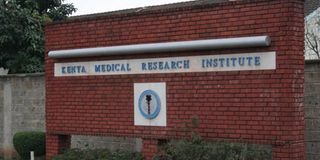Kemri managers sent home as probe into budget gets underway

The Kemri offices in Nairobi. Three senior managers at Kemri (Kenya Medical Research Institute) have been sent on leave as investigations start into claims of financial mismanagement. PHOTO | FILE |
What you need to know:
- Institution said to have only money for a month only
Three senior managers at Kemri (Kenya Medical Research Institute) have been sent on leave as investigations start into claims of financial mismanagement.
This comes after the budget of more than $80 million was depleted prematurely.
This threatens key research and puts more than 1,000 members of staff at risk of losing their jobs.
Centre for Global Health Research director John Vulule and two other senior managers have been sent on leave.
Dr Pauline Mwinzi will take charge in an acting capacity.
Kemri received 92 per cent of the current year’s budget for work in carries out jointly with the Centres for Disease Control but had spent nearly all the money and has less than a month’s supply. The next budget is in five months.
Corporate affairs manager Davis Mgoji said: “Several allegations have been made concerning co-mingling of funds belonging to Co-operative Agreement programme. That’s the reason the board wants investigations,” Mr Mgoji said.
A fortnight ago, The East African reported about Kemri’s financial mismanagement which was exposed by a confidential document from the premier institution’s main donor, the Atlanta, US-based Centres for Disease Control.
“Centres for Disease Control Kenya is working with the Centre for Global Health, the individual programmes and the procurements and grants office to take key measures to support Kemri in dealing with the shortfall, and to investigate and help solve financial management challenges. The investigation will be comprehensive, and is likely to take another few months,” said the document.
The centre has been collaborating with Kemri for 36 years in conducting human health research in malaria, Tuberculosis, HIV/Aids, schistosomiasis and other emerging and re-emerging infectious diseases.
These are covered under an agreement signed between the two parties and runs for five years on renewable terms.
The current agreement covers 2010-2015. The projects are at the Kemri Centre for Global Health Research, in Kisian, Kisumu, where the major field activities are implemented.
The full story is published in the current issue of the East African





